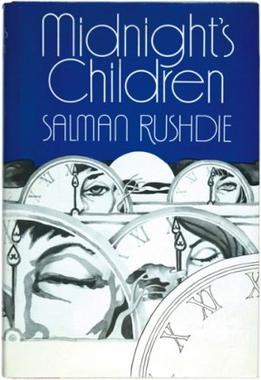Midnight’s Children tells the story of “Saleem Sinai, later variously called Snotnose, Stainface, Baldy, Buddha and even Piece-of-the-Moon,” who was born on 15 August 1947 at the stroke of midnight – at the same hour that India won her independence. It is a story that first chronicles 32 years of his grandparents’ and parents’ lives, before focusing on Saleem’s life in Bombay, Pakistan and Bengal. It is also a novel about India; tracing her journey from the heights of independence (infancy) to her ordinary adulthood, culminating with Indira Gandhi’s Emergency rule.
But this bland description doesn’t do justice to Rushdie’s sweeping novel. It says nothing about his magical prose, about the explosion of colors and smells and sights and sounds. So let me tell you a little more about Snotnose.
Born at midnight, at the precise moment of India’s independence, Saleem was “mysteriously handcuffed to history…thanks to the occult tyrannies of those blandly saluting clocks.” His birth was celebrated with fireworks. His picture was printed in the newspaper. Prime Minister Jawaharlal Nehru sent him a letter saying “We shall be watching over your life with the closest attention; it will be, in a sense, the mirror of our own.” He grew up with a sense of his own importance. He grew up wondering about his purpose. And in his quest for a quiet place in which to think, he found himself retreating to his mother’s laundry hamper. Where one day he discovered his gift for telepathy. From the age of nine, he could enter into other lives at will. And finally, he found all the other magically gifted midnight children scattered across India. At the age of 10 he set up a Midnight’s Children Conference, where he hoped the children could come together to discuss the fate of the nation. But like all 10-year olds, they were overtaken by petty squabbles and dissonance.
As you read Saleem’s story, the “chutnification of history” and “the pickling of time”, you can see parallels with India. Allegorical though they may be, some of them are only hinted at, but they are there. The signs of the potential that India could achieve at birth, the quest for purpose, the slow, inevitable decline to mediocrity. Of course, a lot of events take place because of Saleem. After all, the reason for the Indo-Pakistan war was the annihilation of the Sinnai family!
What more can I say about Stainface? He’s pompous, arrogant, self-centered, grandiose, and somehow loveable. As the narrator of this audacious novel he is absolutely brilliant. He jumps around from one time period to another. When he makes his tall claims, his companion Padma tries to ground him to reality, but of course, he refuses to be so grounded.
In this sweeping canvas of a story, Rushdie brings in the details of a miniaturist. The places and times are captured down to the last detail. Like the Pioneer Café, where Saleem’s mother meets her first husband Nadir Khan.
“…with filmi playback music blaring out from the cheap radio by the cash till, a long narrow greeny room lit by flickering neon, a forbidding world in which broken-toothed men sat at reccine-covered tables with crumpled cards and expressionless eyes.”
The characters, even the minor bit players, are finely detailed. No player, or event, has been tacked on as an afterthought just because an “India novel” would be incomplete without it. There is a lot of history, even though the timelines may not always be right, because Saleem admits that “Memory has its own special kind. It selects, eliminates, alters, exaggerates, minimizes, glorifies, and vilifies also; but in the end it creates its own reality, its heterogeneous but usually coherent version of events…”
In the hands of an inept writer, it would have been an impossible book to read. But Rushdie’s fine art of storytelling turns it into a rich and magical tapestry. Saleem (and through him, since this is magic realism, India) “have begun to crack all over like an old jug–that my poor body, singular, unlovely, buffeted by too much history, subjected to drainage above and drainage below, mutilated by doors, brained by spittoons, has started coming apart at the seams. In short, I am literally disintegrating, slowly for the moment, although there are signs of an acceleration.”
But it does end on a note of hope. Although Saleem, who holds the dream of India within himself, believes he will “eventually crumble into (approximately) six hundred and thirty million particles of anonymous, and necessarily, oblivious dust” as national unity seems like an unachievable dream, he does leave the reader with a sliver of hope. His son Adam, gifted with “elephant ears”, is also inexorably tied to India. In him lies the future of the nation. And who knows what feats he might achieve.
Having read the book, I am now all the more eager to watch the movie, which is slated to release in December 2012. Since Rushdie has been closely involved in the movie making process, I have high hopes from it! Overall, I think this is an excellent book, and I highly, highly recommend it.

